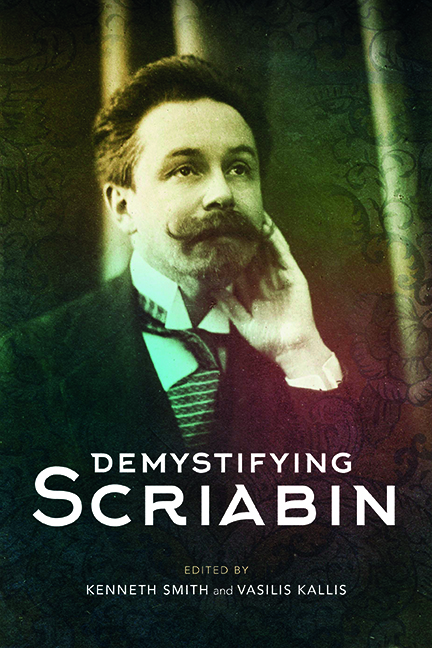6 - Scriabin’s Miniaturism
Published online by Cambridge University Press: 07 October 2022
Summary
Towards the Miniature
A Scriabin score ‘glitters like some imperial Fabergejewel’. So wrote Robert Craft in the centenary yearof 1972. The image has become a staple ofcommentaries on Scriabin. Pick up a recording ofScriabin's music and there is a high chance thecomparison will be found in the liner notes, and itresurfaces in more scholarly contexts: the recentScriabin Companion,for example, describes (without citing Craft) thePrelude, Op. 74 as being ‘like finely crafted gemsor Fabergé eggs’. The likeness highlights thereputation of Scriabin's music as pretty, precious,fastidious, artificial, and aristocratic. And small.Scriabin's critics have long reflected upon hisartistic predilection for the miniature: from IuriĭĖngel’'s 1909 image of Scriabin's expressiveintensity concentrating within ‘four closing-inwalls’ and Scriabin's one-time friend, thedilettante Iuriĭ Sakhnovskiĭ, observing in 1914 thatScriabin ‘does not even write phrases, butcompositions which are shorter than a bear's tail’,to the recent Companion, where it is recounted thatthe youthful Scriabin ‘built miniature pianos toscale to painstaking detail’ and that as a composerhe was a ‘gifted miniaturist’, that ‘throughout hiscareer he endeavoured to compress his musical ideasinto ever-more concise forms. What his preludes lackin duration they compensate for in poeticism andconcentrated intensity’.
Scriabin's fondness for the musically minuscule has notalways been couched in such glowing or glitteringterms. Martin Cooper, a prominent voice in theAnglophone reception of Scriabin in the 1960s,described Scriabin's miniatures as fit for the‘salon’ (seldom a judgement indicating high artisticvalue), as being ‘extremely elegant in form andfacture but already distinguished by a heavy,disturbing, and individual scent very different fromthe characteristically innocent and flowery scent ofChopin's smaller pieces’. Cooper's description isambivalent: he seems uneasy with the tone (orvapours) of Scriabin's miniatures, but thecomparison with Chopin, surely intended as a slightto Scriabin, draws him towards images redolent ofthe delicately perfumed aromas of the effeminate,which Jeffery Kallberg identified as a key elementin the ‘veil of aesthetic suspicion’ that surroundsmanifestations of artistic smallness, and ofChopin's miniatures in particular. Chopin became aromantic archetype of the ‘small composer’.
- Type
- Chapter
- Information
- Demystifying Scriabin , pp. 99 - 114Publisher: Boydell & BrewerPrint publication year: 2022



